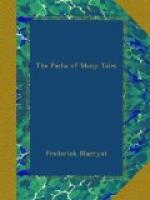As she had yet one year of probation previous to her taking the final vows, which were for ever to seclude her from the world, in seeing her there was no difficulty. Her duteous resignation to the will of her parents, her serene and beautiful countenance, her angelic smile,—all contributed to the increase of my passion; and, after an hour’s conversation, I left her with my heart in a state of tumult, of which it is not easy to express the idea. My visits were repeated again and again. In a short time I declared my sentiments, and found that I was listened to without offending. Before I quitted Cadiz, which my engagements rendered imperative, I obtained from her a reciprocal acknowledgment. And as there were still nine months to pass away previous to her decision upon a monastic life, before that period had elapsed, I faithfully promised to return, and claim her as my own. As we professed the same faith, and she had only been sacrificed that the possessions of her brother might not be diminished by the fortune which her marriage would require, I did not anticipate any objections from her parents. I required no dower, having more than sufficient to supply her with every luxury. We parted; our hands trembled as we locked our fingers through the grating; our tears fell, but could not be mingled; our lips quivered, but could not meet; our hearts were beating with excess of love; but I could not strain her in my embrace. “In three months more, Rosina!” exclaimed I, as I walked backward from the grating, my eyes still fixed upon her. “Till then, farewell, Henrique! Relying upon your faith and honour, I shall not hesitate to cherish your dear image in my heart;”—and, overcome by her feelings, Rosina burst into tears, and hurried from my sight.
I sailed with prosperous gales, and arrived safely at my own country. My ventures were disposed of: I realised a large sum of money, had completed all my arrangements, and in a few days intended to return to Cadiz, to fulfil my engagement with Rosina. I was in the metropolis, impatiently waiting for the remainder of the freight to be put on board of the vessel in which I had taken my passage, when, one evening, as I was sauntering in the Park, anticipating the bliss of rejoining the object of my affection, I was rudely pushed aside by a personage richly attired, who was escorting two of the ladies of the court. Fired at the insult, and, as usual, acting upon the first impulse, I struck him in the face, and drew my sword—forgetting, at the time that I was in the precincts of the Palace. I was seized and imprisoned: my offence was capital; my adversary a relation of the king’s. I offered a large sum for my release; but when they found out that I was wealthy, they rejected, as I increased, my offers, until I was compelled to sacrifice one half of my worldly possessions to escape from the severity of the Star Chamber. But the loss of property was nothing; I had still more than enough: it was




